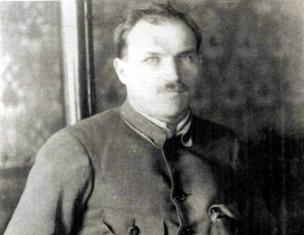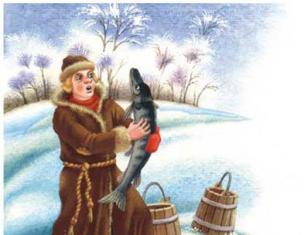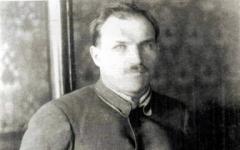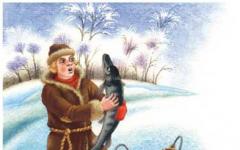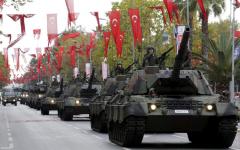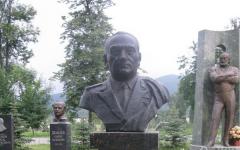How to say: about Tom Wolfe or about Tom Wolfe? Sergei Miroshenko or Sergei Miroshenka? for Andrey Serdyuk or for Andrey Serdyuk? In order to avoid making mistakes when using first and last names in various cases, you should remember several rules.
Names starting with a consonant
Male foreign names ending in a consonant (whether used alone or together with the surname) are declined, i.e. in various cases they acquire the corresponding Russian case endings: Jack London - JackA LondonA oh Jacke Londone etc. (wrong * at Jack London, *about Jack London); Stephen Spielberg – to Stephenat Spielbergat , with Stephenohm Spielbergohm etc. (wrong * to Steven Spielberg, *with Steven Spielberg), paintings PaulI GauguinA , fairy tales HansA ChristianA AndersenA etc. Exceptions to this rule are sometimes double French names; for them only the second component of the name is declined: Jean Jacques Rousseau - oh Jean Jacquese Rousseau etc.; Jean Paul Belmondo – Jean PaulI eat Belmondo, to Jean Paulyu Belmondo.
Names with a vowel
Male foreign names ending with a vowel ( Carlo, Henri, Paolo, Jose, Gianni etc.), do not bow: about Paolo Pergolese, with José Carreras, with Gianni Rodari etc.
Surnames with a consonant
Russian and foreign surnames ending in a consonant are declined if they refer to a man, and not declined if they refer to a woman: Pivnyuk – with Alexey PivnyukA , But: from Natalia Pivnyuk; Belous - with Pavel Belousohm , But: with Tamara Belous; Pron - about Andrey Prone , But: about Anna Pron, Sverchuk -remember Nikolai Svirchuke , But: about Svetlana Sverchuk; Strizhak – meet with Valery Strizhakohm , But: with Maria Strizhak; Karamysh – interview with Vitaly KaramyshA , But: Nina Karamysh;Jacques Chirac – visit of Jacques ChiracA , Gerhard Schröder – visit of Gerhard SchröderA , Brown - for Tom BrownA , But: for Maria Brown;Scott - novel WalterA ScottA ; Sagan - a novel by Françoise Sagan, Edith Piaf - Piaf's songs, Catherine Deneuve - the new role of Catherine Deneuve.
Exceptions:
a) last names -s/-s (Red, Gray, Tersky), which never bow: at Anton Krasnykh, at Irina Krasnykh;
b) surnames that are completely consonant with the names of animals or inanimate objects (it would be better to say thanks to Andrey Zhuk, not * Andrey Zhuk; for Mr. Pie, not * for Mr. Pie etc.).
Surnames starting with -/- or to another vowel
Foreign language surnames ending in accent -a/-z or to another vowel, do not decline: Hugo - a novel by Victor Hugo, Verdi - an opera by Giupeppe Verdi, Coelho - an interview with Paulo Coelho, Modigliani - an exhibition of Modigliani, Versace - a model from Versace.
Surnames with unaccented -PO Box
Foreign language surnames ending in an unstressed vowel -a/-z , inclined: Petrarch – poems by Francesco PetrarchAnd , Kundera – novel by Milan Kunders , Goya – paintings by GoyAnd , Kafka – Kafka novelsAnd , Capablanca – Capablanca gameAnd , Okudzhava – songs of Okudzhavas .
The exception is surnames -ia/-ia (Garcia - poetry Garcia); Finnish and Estonian surnames: Yussela - under the leadership of Yussela, William Sryala - about William Sryala, Allan Skkula - for Allan Skula, Kustaa Vlkuna - with Kustaa Vlkuna.
Slavic surnames with unaccented -PO Box
Slavic surnames in -a/-z decline regardless of the stress of this sound: Skovoroda - about Grigory Skovorode , Belka - from Ivan BelkAnd , at Maria BelkAnd .
Ukrainian surnames starting with -O
Ukrainian surnames -O (Shevchenko, Karpenko, Pasko, Danilenko) according to the standards of the modern Russian language, it is not recommended to decline: to visit Karpenko(wrong * to Karpenka, *to Karpenki), ask at Pasko's(wrong * at Paska's), heard from Danilenko(wrong * from Danilenka).
Slavic surnames in-ago, -yago, -ovo
Slavic surnames in -ago, -yago, -ovo do not bow: talking about Viktor Dobrovo, I see Ivan Gonzago.
Double surnames and given names
In Russian double surnames, both parts are changed if they are independent ( music SolovievA -SedWow , portrait of GolenishchevA -KutuzovA ), and only the second part is declined if the first part is not independent ( street Miklouho-MaklaI , memoirs of Knipper-ChekhovOuch , works by Sukhovo-KobylinA ).
In double names like Ahmad Shah, Zakir Khan Only the second part is inclined: negotiations withAhmad-Shazom Masoudohm , come to Zakir-Khan Mamedovat .
Nicknames of literary characters
The controversial nicknames of historical figures and literary characters are not inclined: Ivan Antonovich Pitcher Snout, Vsevolod the Big Nest, with Vladimir the Red Sun, Richard the Lionheart.
Questions and tasks
1. How are Russian and foreign surnames ending in a consonant pronounced?
2. Do Slavic surnames begin with -а/-я?
3. Do Ukrainian surnames change by case to -o?
4. How do parts of Russian double surnames change with declension?
5. Make up phrases using different cases, using the nickname of the literary character Richard the Lionheart.
Structural and logical diagram "Declination of names and surnames"
P.1. Foreign names and surnames naming male persons ending in a consonant and an unstressed vowel are declined - A.
Foreign-language female surnames are not declined.
Ashot Petrosyan – opinion of Ashot Petrosyan ( But: Galina Petrosyan); George Byron - poems by George Byron(But: Ada Byron); Anatoly Belaga – textbook Anatoly Belaga.
Foreign-language surnames ending in vowels are not declined (except for the unstressed vowel - A; Eugene Delacroix– drawings by Eugene Delacroix, Alphonse Daudet – novel by Alphonse Daudet, Giuseppe Verdi – music by Giuseppe Verdi, Jorge Amadou – the talent of Jorge Amadou, Sergo Zakariadze – the role of Sergo Zakariadze.
Notes Declension of male surnames ending in a consonant or unstressed vowel -A, is explained by the analogy of these foreign-language surnames with Russian surnames ending in a consonant (Smirnov, Sinitsyn), as well as in an unstressed vowel - A(Smirnova, Sinitsyna).
The invariability of surnames in the feminine gender is explained by the tendency to differentiate between male and female persons when calling them by their surname.
Nevertheless, there is a tendency to decline foreign-language female names and surnames ending in an unstressed vowel -A: Mariette Chikobava – the role of Mariet Chikobava and the role of Mariet Chikobava. Songs of Edita Piekha.
P.2. Foreign language inflected surnames and given names in the instrumental case have the ending - ohm, -I eat. Meeting with President Franklin Roosevelt, Prime Minister Winston Churchill. Friendship between Ogarev and Herzen.
P.3. Mostly Slavic surnames bow down.
Leaning male and female surnames ending in -th(by type of declension of adjectives): Met Vasily Zadorozhny – Anna Zadorozhnaya; opinion Alexandra Pshenichny – Lyudmila Pshenichnaya.
Leaning male surnames ending in a consonant: Andrey Marchuk – knows Andrey Marchuk(But: I know Alena Marchuk).
Leaning male and female surnames ending in an unstressed vowel -A. Composer Mayboroda – music by Mayboroda, figure skater Padalka – performance by Padalka. Vasily Yarga, Olga Yarga - a story by Vasily Yarga, Olga Yarga.
Don't bow Slavic surnames ending in
-ago, -ago (Dr. Dubyago's opinion);
-y, -them (letter from Peter Sedykh);
-ko, -o (poems by Taras Shevchenko, works of professor Nikolai Durnov).
P.4. Problems of declension/non-declension of Slavic surnames arise when Slavic (and some foreign language) surnames coincide with common nouns ( Andrey Selezen, Alla Music, Stanislav Uchenik, Andre Stahl).
Note. Linguistic experts point out the need for such surnames incline. In particular, in the Handbook of Practical Stylistics of the Modern Russian Language, Doctor of Philology, Professor of Moscow State University Yu.A. Belchikov points out: “ Indeclension male surnames like Sheremet, Hare, Wolfconsidered an error, violation of the norm." And further: “Surnames that coincide in spelling with common nouns, as well as with personal names and toponyms, are perceived as a deviation from the norm that has developed in the Russian language and in the linguistic consciousness of its speakers. In accordance with this norm, in order to avoid unwanted homonymy and inappropriate associations, the surname, if possible, should be somehow different from words denoting specific objects, body parts, abstract concepts, living beings, a person’s profession, position, rank, social status, etc. .p., as well as from personal names (both passport and unofficial, e.g. Pavlik, Lyubochka). The bearers of such surnames – as required by the norm – strive to separate them from homonymous common nouns and proper names by formal features.”
change the emphasis in the surname. Alexey Berlin - city of Berlin, Irina Verba - blooming pussy willow;
when declension of surnames, leave the letter composition unchanged (in cases where letters are dropped when declension of a common noun). Pyotr Koren is a root, if there is no Peter Koren, there is no root.
Note.“When declining surnames of the named types in order to reduce the possibility of inappropriate associations and unwanted homonymy, a noun or phrase with nouns is placed before the surname as the main word denoting the position, rank, profession, social status of the bearer of this surname. Book by writer Peter Sokol. Interview with the laureate of the singing competition Boris Pavlik, visiting the composer Andrei Melnik” (Cit. Recommendation by Yu.A. Belchikov);
“In documents, business papers, in information genres of the media (especially in news materials, in newsreels), in general in official situations in order to preserve for accuracy of information the original (passport) form of the surname of a given person (in the nominative singular case) male surnames of the type in question don't bow. In such situations and contexts, it is recommended to use before the surname the designation of the official, social status of the bearer of this surname and / or his first name and patronymic. In connection with the anniversary of the Institute of Linguistics, award a certificate of honor to the head of the laboratory of applied linguistics, Professor A.V. Marshal. A group of French scientists led by academician Albert Cote took part in the conference. Roberta Sherif's dissertation defense. Discussion of the story by Stefan Korzh." (Cit. Recommendation by Yu.A. Belchikov);
Surnames that can cause ridicule, and therefore disrespect for the bearers of these surnames, for ethical reasons or in accordance with the family traditions of bearers of a problematic surname, may don't bow down. I don’t hear Seryozha Poganets answer. Misha Sliznyak was not in class today.
P.5. Female surnames of Slavic origin that coincide with common nouns do not decline with a consonant (including -y). T Irina Rekemchuk's phone, the role of Elena Solovey, Alla Zaigray's address.
P.6. Double first and last names. In double names and surnames, both parts are declined if they are independent proper nouns. Novels by Mamin-Sibiryak, fairy tales by Hans Christian Andersen, books by Pierre-Henri Simon. If the first part of the first or last name is not perceived as an independent proper name, then it is not declined. Meeting with Bonch-Bruevich. Laugh at Gogol's mayor Skvoznik-Dmukhanovsky.
Note. In Korean and Vietnamese compound names and surnames, only the last part is declined. Kim Il Sung – speech by Kim Il Sung. Also, the first part of double names like Ahmad Shah, Zakir Khan. Negotiations with Ahmad Shah Masud, come to Zahir_Khan Mamedov.
P.7. Surnames denoting several persons.
If non-Russian surnames refer to two or more persons, it is possible to use the surname in the singular and in the plural.
Plural form only with words father And son: father and son Schlegel.
Only singular form with word sisters: Fisher sisters.
In other cases, both singular and plural variants are used. Prize of the Goncourt and Goncourt brothers. Reception of the Nixon and Nixon spouses. Album with the coats of arms of Friesengoff and Friesengoff.
Note.Preference is given singular forms and the invariability of surnames denoting female persons, including in combination with male persons. Spouses Mariengof, Husband and wife Rosenberg. Father and daughter Ulrich.
P.8. When declension in the form of the instrumental case singular, foreign-language names and surnames have the ending - oh, -eat: Be friends with Karel Gott, with Bill Clinton, with George Bush.
(Compare with Russian surnames: Be friends with Ivanov, Pavlov).
1. Geographical names
1.1. If the geographical name is not declined, then it is marked several. In other cases, for each toponym a gender form is given. pad. It is given in full:
1) with monosyllabic names: Belz, Bel lza; Gzhel, Gzheli;
2) in non-word names, which are ordinary phrases: Stary Oskol, Stary Oskol;
3) in compound words written with a hyphen: Baba -Durma z, Baba -Durma for; Ba den - Ba den, Ba den - Ba den [de].
In other cases, the form gen. pad. is given in truncated form: Badhy z, -a; Babad g, -a; Bavleny, -en; Badajo s, -a.
1.2. For some toponyms, forms of other cases are also given: for geographical names in - evo, -ovo, -foreign, -yno forms of genus, creative are given. and sentence pad., since in speech practice, in the press, in television and radio broadcasts, these names are sometimes not declined, which contradicts the traditional norm of the Russian literary language, for example: Bagerovo, -a, -om, in Bagerovo (urban town, Ukraine) ; Ko sovo, -a, -om, in Ko sovo (Rep. Serbia); Gabrovo, -a, -om, in Gabrovo (city, Bulgaria).
1.3. East Slavic names ending - O with a preceding consonant, do not decline: Dubno, several. (city, Ukraine); No, several. (city, Ukraine); Gross bottom, several. (city, Belarus).
1.4. In geographical names on - ev, -yev, -ov, -in the forms of the genitive and instrumental are given: Belev, -a, -om (city, Tula region, Russian Federation); Bobro in, -a, -om (city, Voronezh region, Russian Federation); Bardejov, -a, -om (city, Slovakia); Babi n, -a, -om (lake, Canada).
1.5. Foreign place names ending in a vowel - A, experience significant fluctuations in inclination:
many borrowed geographical names mastered by the Russian language are declined according to the type of noun. wives kind of - A stressed, for example: Bukhara, -ы; Bugulma, -s; Ankara, -s;
Toponyms of French origin with final stress are not declined: Yura, several. (mountains - France; Switzerland);
Japanese place names ending in - are declined A unstressed: O saka, -i; Yoko bitch, -i [yo];
Estonian and Finnish names ending in - are not declined A, -I unstressed: Sa vonlinna, several. (city, Finland); Yu väskylä, several. (city, Finland); Sa aremaa, several. (island, Estonia);
Abkhazian and Georgian toponyms ending in unstressed - experience fluctuations in declination - A. The Dictionary lists the names in the inflected version: Шxa pa, -ы (g. - on the border of Georgia and Kabardino-Balkaria, Russian Federation); Ochamchi ra, -y (city, Republic of Abkhazia); Gudau ta, -y (city, Republic of Abkhazia);
complex geographical names do not tend to - A unstressed, borrowed from Spanish and other Romance languages: Bai ya Blanca, several. (city, Argentina); Bai ya-La ypa, several. (city, Argentina); Here s-de-la-Fronte ra [re, de, te], several. (city, Spain);
complex Slavic names are declined as nouns, which are nouns in the presence of word-formation features of adjectives, for example: Bya la-Podlya ska, Bya la-Podlya ski (city, Poland); Banská Bistrica, Banská Bistrica (city, Slovakia); Zielona Gora, Zielona Gora (city, Poland);
both parts in names with the word river are inflected, for example: Moscow -river, Moskva -river, on the Moscow river, etc. But in colloquial speech there are cases of indeclinability of the first part of these combinations: beyond the Moscow river, on the Moscow river, etc. d. However, such use does not correspond to the norm of literary language.
1.6. Place names ending in vowels - And, -s and not perceived in Russian as plural forms. numbers are given in indeclinable form, for example: Burley, several. (village, Kazakhstan); Karshi, several. (village, Turkmenistan); Ismayilli, several., (city, Azerbaijan); Mary, several. (city, Turkmenistan); Dzhusaly, several. (town, Kazakhstan).
1.7. For monosyllabic names ending in a soft consonant, the forms gen., date are given. and sentence fallen., since they experience fluctuations when declination: Rus', Rus', to Rus', in Rus'; Ob, Ob, to Ob, on Ob; Perm, Perm, to Perm, about Perm; Kerch, Kerch, to Kerch, in Kerch. In the latter case, the stress is fixed on the base.
1.8. For names ending in consonants - and, -ts, -w, gender forms are indicated. and creativity fallen., since in creation. pad. under stress it is written - O, and without accent - e, for example: Fateh, -a, -em (city, Kursk region, Russian Federation); Kirzha h, -a, -o m (city, Vladimir region, Russian Federation).
1.9. Some foreign names like Se nt-Ka tarins [se] are not inclined several., (city, Canada); Pe r--Lashe z [pe], several. (cemetery in Paris); Pla ya-Hiro n (Pla ya-Hiro n), several. (village, Cuba).
1.10. Some foreign language names from the area of urban nomenclature are given in indeclinable form with the second part - straight, -square: Woll-street, several.; Washington Square, several. etc.
O, -e, -And, -at, -yu, are presented in the Dictionary in an indeclinable form, for example: SHI LO Nikolai, Shi lo Nikola ya (Russian geologist); CRAFT Vasily, Craft Vasily (Russian breeder); DURNOVO Ivana, Durnovo Ivana (Russian statesman); VA JKULE Laima, Va ikule Laima (Latvian pop singer); VESKI And anne, several. (Estonian pop singer); BASILASHVI LI Ole g, Basilashvi li Olega (Russian actor); ILIE SKU Ion, Ilie sku Io na (Romanian statesman); BENTO Yu Pasca l, Bento Yu Pasca la (Romanian composer).
3. Male and female surnames and personal names ending in -a, -ya, -iya, -aya, -oh
Male and female surnames and personal names ending in - A, -I, -and I, -oh, -oh, as a rule, are inclined. But there are also cases of their indeclension, which is due to the place of stress in the word and the tradition of their use in the Russian language:
3.1. Male and female surnames and personal names ending in - A, -I non-accented ones, as a rule, are inclined; for example: TO MA Svetlana, TO WE Svetlana (Russian actress), DO GA Evgeniy, DO GI Evgenia (Moldova composer).
3.2. Japanese first and last names ending in - A unstressed, recently in print, in television and radio broadcasts, and in literature, they are regularly inclined. The Dictionary gives: KUROSA WA Akira, Kurosa you Akira (Japanese director); HATOYA MA Ichi ro, Hatoya we Ichi ro (Japanese statesman).
3.3. Georgian names and surnames of the indicated type experience fluctuations during declension, but in accordance with the norm of the Russian literary language they should be declined, for example: OKUDZHA VA Bula t, Okudzha you Bula ta; HORA VA Aka kiya, Hora you Aka kiya; VA ZHA Pshavela, VAZHA Pshavely. But the name of the Georgian poet ending in - A stressed, Shota Rustavi is not traditionally declined in Russian.
3.4. Finnish given names and surnames ending in - A unstressed, mostly not inflected, for example: KE KKONEN U rho Kaleva, Ke kkonena U rho Kaleva, PE KKALA Ma yno, several.
3.5. First and last names ending in - A with the previous one - And, do not decline, for example: GAMSAKHU RDIA Konstantin, Gamsahu RDIA Konstantin (Georgian writer).
3.6. Slavic surnames ending in - A stressed, incline: Skovoroda Gregory, Skovoroda Gregory (Ukrainian philosopher); POTEBNYA Aleksandra, Potebnya Aleksandra (Ukrainian and Russian philologist-Slavist).
3.7. French surnames and personal names ending in - A percussion, do not bow: TALMA Francois, several. (French actor); THOMAS Ambrois z, Thomas Ambrois (French composer); GAMARRA Pierre, Gamarra Pierre (French writer); DUMA Alexandra, Dumas Alexandra (French writer).
3.8. Some African surnames start with - A shock experience fluctuations in declination: BABANGIDA Ibragi m, Babangida Ibragi ma (states figure of Nigeria); YAMARA Semoko [se], several. (general figure of Chad).
3.9. Women's personal names and surnames ending - oh Declined according to the model of the declension of personal names such as Ra ya, Ta ya, Agla ya. The Dictionary gives the forms of gender, date. and sentence pad., for example: GULA I I nna, Gula i Inn, to Gula e I nna, about Gula e I nna (Russian actress); SANA I Marina, Sana and Marina, to Sana e Mari not, about Sana e Mari not (Russian figure skater).
3.10. Male surnames ending - oh decline according to the type of declension of noun. “needles”, for example: PIKHO I Rudolf, Piho and Rudolf, to Piho e Rudolf, about Piho e Rudolf (Russian statesman).
3.11. Georgian surnames ending in - and I, are declined according to the model of the name Marie I (Mari I, gen., dat., prel. AndAnd), although in speech practice, on TV and radio, and in print, surnames of this type are sometimes not declined, which does not correspond to the norm of the Russian literary language. Correct: DANELIA Georgy, Daneliya Georgy, to Daneliya Georgy, about Daneliya Georgy [ne] (Russian film director); ALEXA NDRIA Na na, Alexandria Na us, to Alexandria Na not, about Alexandria Na not (Georgian chess player); CHKO NIYA Lamara, Chko niy Lama ry, to Chko niy Lama, about Chko niy Lama (Georgian actress).
3.12. Personal names I ya, Li ya, Vi ya, Ti ya, Gi ya (masculine Georgian name) are given gender and date forms. and sentence pad. with ending - II: And I, And and, to And and, about And and. There is a second way of inflecting these names: And I, And and, to I e, about I e. The dictionary gives preference to the first, i.e.: And I, And and, to And and, about And and.
3.13. For personal names and surnames of eastern origin such as Aliya, Alfiya, Zulfiya, gender and date forms are given. and sentence pad.: Zulfiya, -ii; to Zulfiya, about Zulfiya.
4. Male and female surnames and personal names ending with a consonant (including th)
4.1. Male surnames and personal names ending in a consonant (hard or soft) are declined: DAL Vladi mir, Da la Vladi mir; BRECHT Berto lta, Brechta Berto lta [re].
4.2. Male and female surnames ending in - their, -s, do not bow: RAVENSKIKH Nikolai, Ravenskikh Nikolai (Russian director); CHEREMNY X Mikhai l, Cheremny X Mikhai la (Russian artist); Cheremny x, several. (feminine form).
4.3. To male names and surnames ending in hissing and - ts, the forms of the genus are given. and creativity pad. Under the stress of creation. pad. is written - O, and without accent - e, for example: Liszt Ferenc, Liszt Ferenc, Liszt Ferenc (Hungarian composer, pianist, conductor); BA RENZ Willem, Barents Willem, Barents Willem (Dutch navigator); BILA SH Aleksandra, Bilasha Aleksandra, Bilasho m Aleksandr (Russian composer); BA LAZH (Balash) Bela, Balazha (Balasha) Bely, Balazhem (Balash) Beloy (Hungarian writer). However, there are exceptions, for example: TE LESHOV Nikolai, Teleshova Nikola I (Russian writer); VLADI MIRTSOV Bori s, Vladi Mirtsova Bori sa (scientist - Mongolian); KOKO VTSOV Pa Vel, Koko Vtsova Pa Vla (Russian Semitic scientist).
4.4. Male surnames of East Slavic origin that have a fluent vowel during declension may have two declension options - with and without loss of the vowel, depending on the tradition of their use in literary speech. The Dictionary gives: ZA YATS Anatoly, ZA Yats Anatoly (Russian poet); SUDET Ts Vladi mir, SUDET Ts Vladi mir (Russian military leader); GRITSEVETS Sergei, Gritsevets Sergei (Russian pilot); LUCHENO K I Grief, Luchenka I Grief (Belarusian composer); KOVALYONOK Vladi Mir, Kovalyonka Vladi Mir (Russian cosmonaut); MAZURO K Yuri, Mazuro ka Yuri (Russian singer).
4.5. For male surnames and personal names of Western Slavic and Western European origin, gender forms are given. pad. without dropping a vowel, for example: GA SHEK Jarosla v, Gasheka Jarosla va (Czech writer); GA VRANEK Bo Guslav, GA VRANEK Bo Guslava [ne] (Czech linguist); GOTT Karel, Go tta Karela [re] (Czech singer).
4.6. Male Polish, Czech and Slovak surnames in - skiy, -Tsky usually given with full endings in the nominative case and declined according to Russian models (following the model of the declension of adjectives), for example: OLBRY CHSKY Danie l, Olbry KHSKY Danie la [ie] (Polish actor); OGINSKI (Oginski) Michal Kleo fas, Oginski (Oginski) Michal Kleo fas (Polish composer). But sometimes surnames of this type are used in an indeclinable form, for example: POLA NSKI Roman, Polanski Roma (Polish film director), although on the recommendation of experts they should be declined. The dictionary gives: POLANSKY (Polanskiy) Roman, Polanskiy (Polanskiy) Romana.
4.7. Women's surnames can be formed in different ways: with full endings (- Skye, -Tskaya) and with truncated (- ska, -tska). In both cases, they are more often declined according to Russian models (following the model of the declension of full adjectives), for example: BANDRO VSKA-TU RSKA Eva, Bandrovskaya-Turskaya E you (Polish singer); BRY LSKA Barbara, Brylska Barbara (Polish actress); CHERNY-STEFANSKA Galina, Czerny--Stefanska Galina (Polish pianist). Quite often, the name Brylskaya is pronounced incorrectly, placing emphasis on the first syllable: Barbara. But in Polish the stress is always on the penultimate syllable: Barbara ra. The Dictionary gives: BRY LSKA Barbara ra.
4.8. With borrowed male surnames ending in unstressed - ov, -in, genus forms are given. and creativity pad. with ending - ohm: DA RVIN Charles, Da Rvin Charles, Da Rvin Charles (English naturalist); CHA PLIN Charles Spencer, Chaplin Charles Spencer, Chaplin Charles Spencer [peh, se] (American film actor, film director); FLO TOV Friedrich, Flotov Friedrich, Flotov Friedrich (German composer). Similar Russian surnames are in the works. pad. ending - th.
4.9. European female surnames with unstressed - ov, -in presented in the Dictionary in indeclinable form: HO JKIN Do roti, several. (English scientist, woman); CHA PLIN Geraldina, Cha PLIN Geraldina (American actress).
4.10. The Dictionary also includes male surnames with accent - in. If these are Russian and Russified male surnames, then they are inclined according to the general rule, i.e. they have a creative meaning. pad. percussion - th. Therefore, this form is not given in the Dictionary, for example: KARAMZI N Nikolai, Karamzina Nikolai; BUTURLI N Vasily, Buturlina Vasily.
4.11. Female surnames of the above type are also inclined according to the Russian model: ROSTOPCHINA Evdoki I, Rostopchino y Evdoki and (Russian poetess).
4.12. To borrowed non-Russified male surnames with an accent - in the form of creation is given. pad. with unstressed - ohm: RACINE Jean, Racine Jean, Racine Jean (French playwright); BARTOLI N Era zm, Bartoli on Era zm, Bartolin nom Era zm (Danish scientist).
4.13. Female surnames of this type are presented in an indeclinable version: DENEV Katri n [de], several. (French actress), BIRKI N Jane, several. (French actress).
4.14. Women's surnames and names ending in a consonant (hard or soft) are given in indeclinable form, for example: VOYNICH Etel el Lilian [te], several. (English writer); COURSE L Nico l [se], several. (French actress).
4.15. Female personal names of biblical origin (Agar, Rachel, Ruth, Shulami f, Esther, Judi f) are declined according to the type of declension of the word “salt” (sol, soli, with soly, about salt), for example; Agary, Agary, with Agary, about Agary. The Dictionary lists the forms gen., creative. and sentence pad. The name Rashe l (Rashel, Rashe li, with Rashe li, about Rashe li), but the stage name of the French actress RACHE L ( present femme. - Eli doesn’t bow to Rush el Feli x)
4.16. The name Lyubov is declined without dropping a vowel; the Dictionary provides gender and date forms. and sentence fall: Love, Love, to Love, oh Love. The names Nine l and Assol fluctuate in declination. The dictionary gives: Nina l, -i [ne] (f. name); Assol, several. (f. name).
5. Complex borrowed names and surnames
5.1. In complex Western names and surnames, connected by a hyphen, the last word is declined: BELMONDO Jean-Paul, Belmondo Jean-Paul (French actor); RUSSO Zha-n-Zhak, Rousseau Zha-n-Zhaka (French writer and philosopher); KAPABLA NKA Jose -Rau l, Capabla nki Jose -Rau la [se] (Cuban chess player). If the second name is not inflected, then the first name takes on the function of inflection, for example: TRENTIGNA N Zsa n-Louis, Trentigna na Zsa na-Louis (French actor); GUY-LUSSA K Jose f-Louis, GAY-Lussa ka Jose f-Louis [ze] (French chemist and physicist).
5.2. In compound names and surnames of Vietnamese, Korean, Burmese, Cambodian, Chinese, etc., the last part is declined: KIM YONG NAM, Kim Yong Na ma (North-Correspondent statesman); BA THEIN TIN, Ba Thein Ti na [te] (Burmese statesman); CH A SIM, Che a Si ma (Cambodian statesman); LI PEN, Li Pe na (Chinese statesman).
6. Double surnames
In Russian double surnames, both parts are declined if their endings can be declined, for example: SOKOLO V-MIKITO V, Sokolo va-Mikitova (Russian writer); GOLENI SHCHEV-KUTU CALL, Shin Shchev-Kutu Zov (Russian poet, philologist, literary critic), but: SOKOLO V-SKALYA, Sokolo va-Skalya (Russian artist).
If the first part is not used as an independent word, it does not decline: DE MUT-MALINO VSKY, De mut-Malinovsky (Russian sculptor); Grum-Grzhima Yilo Vladi mir, Grum-Grzhima ylo Vladi mira (Russian scientist-metallurgist); BO NC-BRUE HIV, Bo NC-BRUEVICH (Russian military leader).
It may not be strange, but with the development of scientific and technical progress and the advent of new means of communication, we begin to forget about the rules of the Russian language.I think I’m not the only one who has relied on spell check in Word and then found typos or misspelled words in their business papers or articles. P.e. More and more often I want to pick up a textbook on the Russian language and brush up on my spelling knowledge...
According to my observations, errors quite often occur when writing foreign names and surnames. Therefore, I decided to write a short post about the rules for declension of first and last names. To begin with, I propose to get acquainted with the structural and logical diagram of declensions, and then study in more detail the rules for declensions of surnames and given names.
And so, we begin again to “study” the Russian language...

Names starting with a consonant
Male foreign names ending in a consonant (whether used alone or together with the surname), bow down, i.e. in various cases they acquire the corresponding Russian case endings:
Right: Jack London - from Jack London, about Jack London, etc.; Steven Spielberg - to Steven Spielberg, with Steven Spielberg, etc.; paintings by Paul Gauguin, fairy tales by Hans Christian Andersen, etc.
wrong
: with Jack London, about Jack London, to Steven Spielberg, with Steven Spielberg,
Exceptions Double French names sometimes result from this rule. For them, only the second component of the name is declined: Jean Jacques Rousseau - about Jean Jacques Rousseau, etc.; Jean Paul Belmondo - Jean Paul Belmondo, to Jean Paul Belmondo.
Names with a vowel
Male foreign names ending in a vowel: Carlo, Henri, Paolo, Jose, Gianni etc., don't bow: about Paolo Pergolese, with Jose Carreras, with Gianni Rodari, etc.
Surnames with a consonant
Russians and consonant, incline, if they refer to a man, and don't bow, if they refer to a woman:
Pivnyuk– from Alexey Pivnyuk, but: from Natalia Pivnyuk;
Belous– with Pavel Belous, but: with Tamara Belous;
Pron-about Andrei Pron, but: about Anna Pron,
Sverchuk– remember Nikolai Svirchuk, but: about Svetlana Sverchuk;
Brown– for Tom Brown, but: for Maria Brown;
Scott- novel by Walter Scott;
Sagan- novel by Françoise Sagan,
Edith Piaf- Piaf songs,
Catherine Deneuve– new role of Catherine Deneuve.
Exceptions:
A) surnames starting with -ИХ/-ИХ(Red, Gray, Tersky), who never bow: from Anton Krasny, from Irina Krasny;
b) last names, in full consonant with the names of animals or inanimate objects:
right: We thank Andrey Zhuk, for Mr. Pirozhka
wrong: We thank Andrey Zhuk, for Mr. Pirozhka
Foreign surnames with a vowel sound
Foreign language surnames ending in stressed -А/-Я/-И on another vowel, do not decline:
Hugo- novel by Victor Hugo,
Verdi- opera by Giupeppe Verdi,
Coelho– interview with Paulo Coelho,
Modigliani– Modigliani exhibition,
Versace- model from Versace.
Foreign surnames with unstressed -A/-Z
Foreign language surnames ending in unstressed vowel -А/-Я, incline: Petrarch- poems by Francesco Petrarch,
Kundera- novel by Milan Kundera,
Goya- paintings by Goya,
Kafka-Kafka's novels
Capablanca- Capablanca's game
Okudzhava- songs by Okudzhava.
Exception are:
1. last names on -IA/-IA(Garcia - Garcia's poems);
2. Finnish and Estonian surnames: Yussela– under the leadership of Yussel, William Sryala
– about William Sryala, Allan Skula
– for Allan Skul, Kustaa Vlkuna
– from Kustaa Vlkuna.
Slavic surnames with unstressed -A/-Z
Slavic surnames in -A/-Z decline regardless of the stress of this sound:
Pan– about Grigory Skovoroda,
Squirrel– from Ivan Belka, from Maria Belka.
Slavic surnames starting with -O
Slavic surnames in -ABOUT (Shevchenko, Karpenko, Lysenko, Danilenko
) don't bow:
Right: visit Karpenko, ask Lysenko, hear from Danilenko
wrong
: to Karpenka, to Karpenki; ask Lysenko hear from Danilenka
Slavic surnames starting with -AGO, -YAGO, -OVO
Slavic surnames in -AGO/-YAGO/-OVO don't bow: talk about Victor Dobrovo, I see Ivan Gonzago .
Double surnames and given names
In Russian double surnames change both parts, if they are independent:
music Solovyov-Sedoy
,
portrait Golenishcheva-Kutuzova
And only the second part is inclined, if the first one is not independent:
street Miklouho-Maclay
,
memories Knipper-Chekhovoy
,
works Sukhovo-Kobylina
.
IN double names type Ahmad Shah, Zakir Khan Only the second part is inclined: negotiations with Ahmad-Shaz Masud, to come to Zakir-Khan Mamedov.
Nicknames of literary characters
Don't bow ambiguous nicknames of historical figures and literary characters: Ivan Antonovich Pitcher Snout, Vsevolod the Big Nest, with Vladimir the Red Sun, Richard the Lionheart.
To be continued...


